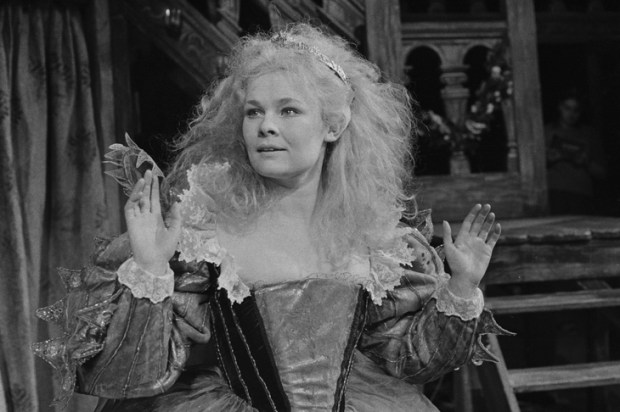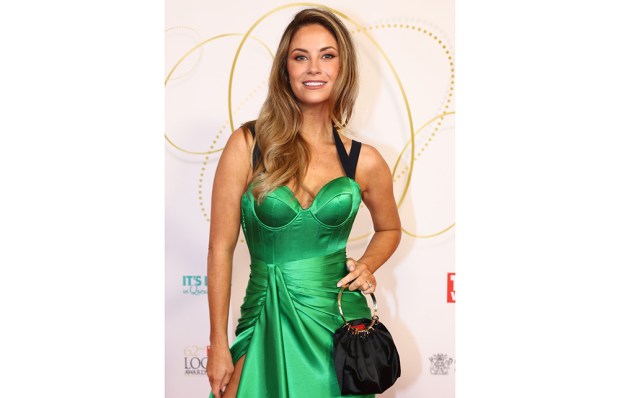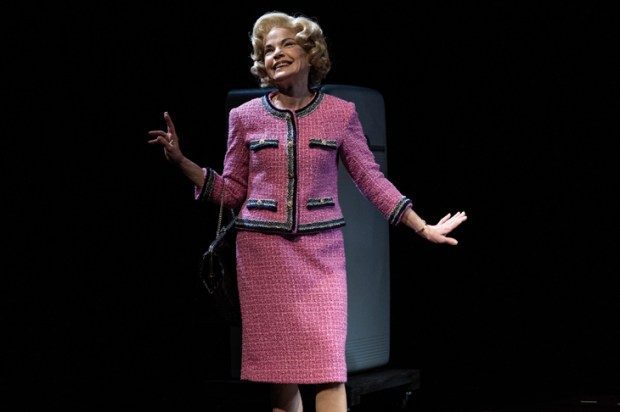For a century King Lear has been thought of as the greatest of Shakespeare’s tragedies and the title role as the supreme test for an actor. What a challenge it is to hold the stage as the mad old king who gives away his kingdom to his daughters. Well, the first thing to say about Robert Menzies’ performance is that it could hold any stage in the world.
It doesn’t matter that Peter Evans’ production is a bit basic and may confuse people who are not intimate with the play. Lizzie Schebesta is a fine Goneril and it was puzzling to get a female Edgar and a female Kent but the fact that Evans’ production sometimes looks like a high-school run-through doesn’t matter. This is Robert Menzies in the role of his career, giving the performance of his life.
He starts almost quietly with his ‘Nothing will come from nothing’ rage at Cordelia and then at Kent, ‘Come not between the dragon and his wrath’. But then there is the tremendously eviscerating attack on Goneril wishing a child on her that will be a ‘thwart disnatured torment’. It is as if Menzies’ Lear is shredding the intimacies of intimate physical life. In a measured performance of considerable stature Menzies is baffled by a universe he cannot rule. When he says, ‘Reason not the need’ he is bewildered and then, ‘Blow, winds, and crack your cheeks!’ is given an electrical intensity. Still in the tenor range of his formidable technique this is an aria way beyond the self-analysis of soliloquy and Menzies wins hands down against the zigzagging and vivid lightning of Benjamin Cisterne.
The hovel scene with Lear sitting in deranged judgment on his daughters is exceptionally hard to do in a production like this because it depends on expertly co-ordinated ensemble work with everyone playing mad in order to settle down the mad king. Robert Menzies holds the dramatic coherence of this supreme enactment of psychic chaos almost alone with the young cast feeding him lines which they cannot sound the depths of. He does the lion’s share of this dazzling turbulence with sweeping agility and power. It has the highest claims to be seen as the greatest representation of madness in the history of the world and this production indicates the abyss of loneliness into which Lear has fallen.
Then the play itself falls into derangement and fantastic horrors. The two unco-operative sisters, Goneril and Regan, who have so far been fiends only in an old man’s imagination, turn into fiends indeed. Gloucester is blinded and Edgar, disguised as poor Tom, nurses his father and his imaginary fall from the cliffs of Dover.
It’s the longest period Lear has been off-stage. He comes back, unmistakably mad but with his own piercing insights to greet his blind retainer and his one good son. This is the scene Michael Blakemore said Charles Laughton performed flawlessly and you get the same uncanny feeling with Menzies of a dark sense of ruin and of jokes collapsing like the foundations of the Earth, ‘I know thee well enough, thy name is Gloucester. / Thou must be patient; we came crying hither: / Thou know’st the first time that we smell the air / We wawl and cry. I will preach to thee: mark.’ The technique is comic, the form jumps between verse and prose, and you feel watching Robert Menzies in this scene that you are watching one of the greatest moments of drama performed exactly as Shakespeare wrote it.
This is a Lear who finds the high and the craggy cliffs of his tragedy in that weird place where comedy meets its opposite. He does the ‘wheel of fire’ speech with a marvellous stillness ‘Thou art a soul in bliss’ he tells Cordelia in this strange purgatorial moment.
Then there is that astonishing speech which made the neoclassicists of the eighteenth century think that Shakespeare did not know how he should end King Lear: ‘We two alone will sing like birds i’ the cage… / And take upon’s the mystery of things, / As if we were God’s spies.’
This is the gentle, ‘touched’ Lear, his penultimate incarnation that at some level looks forward to the tragicomic radiance of the last plays, the romances.
Then everything is destroyed when, on the orders of the glittering anti-hero Edmund, Cordelia is hanged. Menzies in the face of the ‘Howl’ which Shakespeare repeats four times comes out with a guttural sound, gasping and retching as if every shred of his inner being was damaged irrevocably. We believe his death is the consequence of his daughter’s because Menzies’ performance has a visceral reality. This is a Lear of the first order, consummate and utterly convincing.
And to see an actor of the first rank do the ‘Howl’ is to have looked into the abyss of what’s possible in human suffering and – through the paradox of art – what the theatre can achieve. This is essentially a one-man show with the chorus of a largely young cast. Robert Menzies carries them with him, he watches, he crumbles, he soars. Yes, it would be good if he were supported by the finest actors the country has produced. What if Richard Roxburgh were his Gloucester? What if Geoffrey Rush were to realise his ambition of playing the Fool again (as he did with Warren Mitchell in Brisbane in the 1970s)? What if Nikki Shiels and Kat Stewart – both of whom are preoccupied with classic modern roles – were to play Goneril and Regan?
Well, Peter Evans had the great good sense to get Robert Menzies to play the supreme role in our dramatic culture and we are in his debt. Forget your impatience with Bell, this is an opportunity to see an actor with an empathic feeling for the deep truth of Shakespeare to enact the horror and the glory of King Lear.
That eminent critic Sam Goldberg, the teacher of Germaine Greer, said once that he didn’t think Shakespeare’s mind was on anything much apart from Lear in the latter part of the play. He was not quite right but this does capture the way the sisters gone bad, the brothers internecine and the whole Gloucester subplot are footnotes to Lear. So see this performance and don’t be worried by the supporting cast. The figure Tolstoy saw himself in is enough to be getting on with.
Got something to add? Join the discussion and comment below.
You might disagree with half of it, but you’ll enjoy reading all of it. Try your first month for free, then just $2 a week for the remainder of your first year.













